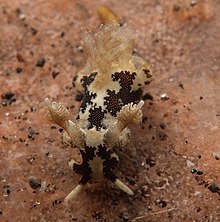Trapania dalva
Trapania dalva is a species of sea slug, a dorid nudibranch, a marine gastropod mollusc in the family Goniodorididae.[2]
| Trapania dalva | |
|---|---|
 | |
| Scientific classification | |
| Kingdom: | |
| Phylum: | |
| Class: | |
| (unranked): | clade Heterobranchia clade Euthyneura clade Nudipleura clade Nudibranchia clade Euctenidiacea clade Doridacea |
| Superfamily: | |
| Family: | |
| Genus: | |
| Species: | T. dalva |
| Binomial name | |
| Trapania dalva Marcus, 1972[1] | |
Distribution
This species was first described from Miami, Florida.[1] It has also been reported from the Bahamas.[3]
Description
This goniodorid nudibranch is cream with brown patches, with white bosses on the body.[1] This appearance with raised tubercles is illustrated in one photograph from Florida.[4] Larger animals have extensive brown patches reminiscent of Trapania brunnea and small raised tubercles. These are thought to be the adult form of this species.[5]
The maximum recorded body length is 12 mm.[6]
Ecology
Minimum recorded depth is 0 m.[6] Maximum recorded depth is 0 m.[6]
Trapania dalva probably feeds on Entoprocta which often grow on sponges, sea squirts and other living substrata.
References
- Marcus, E. d. B.-R., 1972. On some Opisthobranchs from Florida. Bulletin of Marine Science, 22(2): 284-308.
- Rosenberg, G. (2015). Trapania dalva. In: MolluscaBase (2015). Accessed through: World Register of Marine Species on 2015-10-17
- Colin Redfern, 2001. Bahamian Seashells: a Thousand Species from Abaco, Bahamas. BahamianSeashells.com, Inc. Boca Raton, Florida. 280 pages, 106 b/w plates, 18 color plates. ISBN 0-9711066-0-6
- Rudman, W.B., 2002 (Oct 31). Comment on Trapania dalva - juvenile? by Linda Ianniello. [Message in] Sea Slug Forum. Australian Museum, Sydney.
- Rudman, W.B., 2002 (March 4) Trapania dalva Marcus, 1972. [In] Sea Slug Forum. Australian Museum, Sydney.
- Welch J. J. (2010). "The “Island Rule” and Deep-Sea Gastropods: Re-Examining the Evidence". PLoS ONE 5(1): e8776. doi:10.1371/journal.pone.0008776.